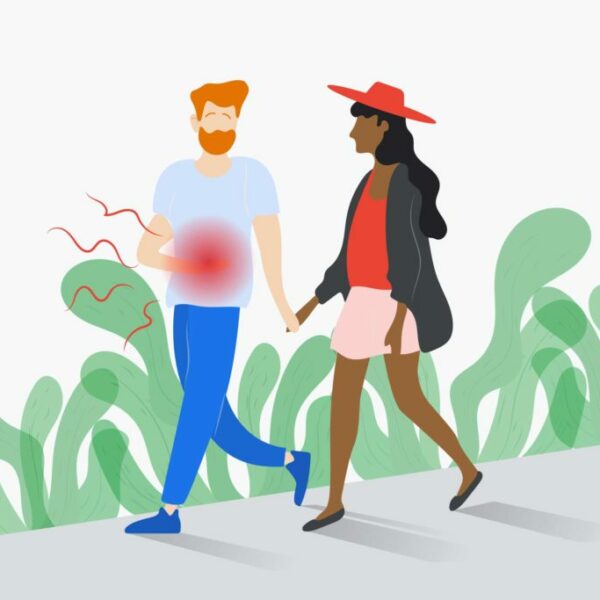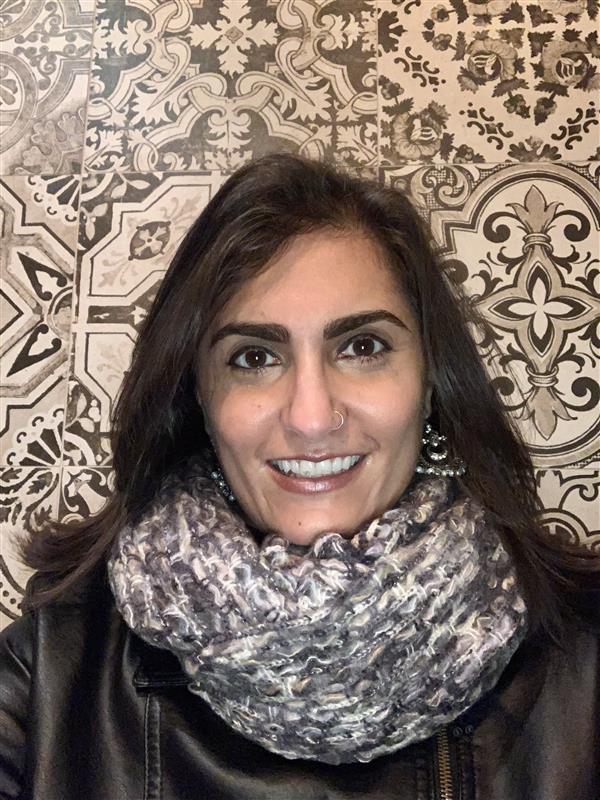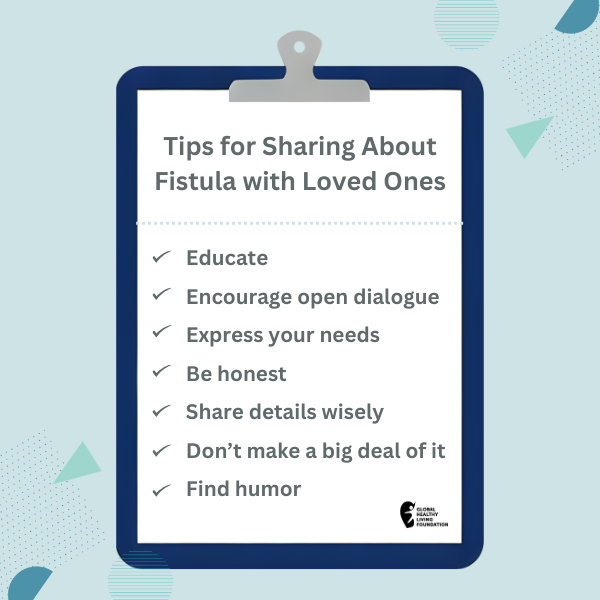In honor of World IBD Day, dietitians from three different continents share tips on managing diet and inflammatory bowel disease (IBD).
DATING WITH INFLAMMATORY BOWEL DISEASE: 24 CONFESSIONS ABOUT WHAT IT’S REALLY LIKE
DATING WITH INFLAMMATORY BOWEL DISEASE: 24 CONFESSIONS ABOUT WHAT IT’S REALLY LIKE
June 15, 2020
Zoe Rothblatt

If you’re reading this, chances are you’re among us who have struggled with dating because of our inflammatory bowel disease (Crohn’s disease or ulcerative colitis). Normally, this taboo topic doesn’t get a lot of attention — even within the IBD patient community — but this week it trended on social media in response to a New York Times Ethicist advice column titled, “Is It OK to Dump Him Because of His Medical Condition?”
In the column, the advice seeker wonders whether it’s OK not to start a new relationship with someone because of their Crohn’s disease. “I don’t know what to do to support him, and I am worried about the future,” they wrote. “I want to shield myself from the pain, but I also feel like a terrible person for even thinking about it.”
The Ethicist’s response — which was essentially that while you can’t abandon someone with whom you’re in a committed relationship, such as marriage, it’s OK not to enter into a new relationship with someone if you think you won’t be a good partner to them because of their illness — was widely criticized among those of us in the chronic illness community who felt like it was one-sided advice that didn’t reflect the experiences or perspectives of people with disabilities.
As a twenty-something living with Crohn’s disease, I know how sorely lacking any guidance or information about the challenges of dating with inflammatory bowel disease (or any chronic illness, for that matter) is.
So I quickly turned to the Global Healthy Living Foundation’s IBD Patient Council — a group of volunteer patient advocates that advises us on education and support initiatives — for a more nuanced look at what it is really like dating and being in a relationship with someone who has IBD. To protect people’s privacy, we kept responses anonymous.
When do you typically tell someone you’re dating about your IBD?
“The second date. I’m an open book and can’t help myself. I want to know right from the start if the other person is down for it and I don’t want to be with someone who gets uncomfortable talking about poop. My disease is such an intricately woven part of my life. I find it impossible not to talk about. I don’t get into the nitty gritty details of my IBD, like being diagnosed, hospitalized, or my treatment on the first or second date — that takes time. But I am upfront right away about having ulcerative colitis.”
“I always tell them very early on. I feel like I have nothing to hide or be ashamed of regarding my ulcerative colitis. Also, many early dates often center around going for drinks or going out to eat. I may come off as picky when selecting a dish, or may not be willing to go out to a bar because I’m in a flare, so I want to make sure the person I’m seeing knows why I may be extra particular with what I eat or where we go.”
“I was actually hospitalized for and diagnosed with Crohn’s disease a month into a new relationship, so I had no choice but to disclose it as it was happening. As much as I tried to get control of the situation, a nurse would come in and say in front of my partner ‘are you still having that very liquid bloody diarrhea?’ Of course, I had no choice but to answer honestly. In a way this alleviated me of the stress of telling my partner, because it was done for me.”
“It usually comes up pretty early. I used to try to hold off on telling people until we got to know each other, but I have learned to accept that it is a huge part of my life and it isn’t worth trying to hide it. As a result of my IBD, I have a lot of dietary restrictions. It is much easier to explain them when I also talk about my IBD. From the very beginning of trying to pick a restaurant, I have to be very involved. I have to look over the menu and sometimes call and ask questions about ingredients if it isn’t a place I have been to before.”
Has having IBD led to any embarrassing situations on a date?
“In relationships yes, but not on a date. Right now, dating in quarantine is hard. I am all of a sudden living with my new partner,and I have diarrhea a lot. I am trying to figure out how to say I’m bleeding or experiencing symptoms, and struggling to communicate it in a way that will not have him worry. I am also worried about having to prepare for a colonoscopy in front of my partner, as I want to keep the romance and sexy feeling.”
“Not really, fortunately. I try to avoid dating altogether if I’m in a bad flare-up. My flares can sometimes include some really embarrassing symptoms, so if I’m not already in something established, I just forgo dating until I’m doing better physically.”
“With my partner, I’ve definitely had moments of ‘I need the restroom ASAP’ or I need to go home and lie down right now. I never get embarrassed in the moment because there is so much else going on with me, and the focus is on my symptoms. And although my partner is always very understanding and helpful in these situations, sometimes I find myself later in the day getting embarrassed about how disruptive IBD can be.”
“ One time I went out to dinner with a date and he asked if I wanted to split a pizza. I told him that I couldn’t eat gluten and he was totally fine splitting a gluten-free pizza. The pizza came and we both were shocked at how good it tasted. It made me a little nervous but it was New York City and I have had some pretty amazing gluten-free food before. We finished eating and decided to ask the waiter. The waiter had made a mistake and had given us a regular pizza. I didn’t really know how my body would react since I hadn’t eaten gluten in three years at that point but I didn’t want to take any chances, so I quickly went home.”
How have people you’re dating responded to learning you have IBD?
“I find that if you are with someone and there is a connection between you, then the response is always positive. When I was dating in a casual way it wasn’t such a positive experience. I even had someone say to me, ‘Eww, what’s that?’ To me that’s an immediate red flag. They are not the right person if they aren’t loving and respectful of my disease. If you are dating someone that isn’t being open-minded and accepting, you need to take a step back. It isn’t their choice to accept it, it’s whether you are up to navigating the craziness with this person.”
“Surprisingly indifferent. I don’t know if it because I downplay its significance or the potential severity when describing it. I actually feel like most people don’t understand what it’s like to live with an unpredictable disease like this. Since I look healthy for the most part, I think people may liken my disease to a bad stomachache that reoccurs every so often.”
“My significant other has always been understanding about my Crohn’s. Whereas I see it as this huge part of me and sometimes feel like it is consuming me, my partner sees so much else in me and helps me see all the great things that make me who I am, aside from my IBD.”
“Most people have responded well. The only time I know that my IBD really contributed to a relationship not working out was when I started dating someone right before I had a flare. I had to cancel a lot of our dates because I was not feeling up to it. He was actually very understanding and offered to come over, but we had just started dating and I wasn’t comfortable with him seeing me like that yet.”
What have you learned about making is easier to date/ be in a relationship when you have IBD?
“The biggest thing for me is being honest and upfront from the start and trying to set the fear aside as it can be scary to not be accepted by a person. I’ve learned I don’t have to be defined by my disease, but it is part of who I am, so I own my story and being the person who I am. While I bring this ‘baggage’ to the table, I remind myself that the other person is probably bringing something too.”
“Not to downplay my disease out of fear of scaring people away. I want whomever I’m seeing to understand what I have is probably different from what they’re used to, but that I’m still like everyone else.”
“I’ve learned that it is really important to be honest when you are in a relationship with someone. It can be scary to be open and vulnerable, but I find that once I am open, I feel so much better about everything.”
“Communicate! I have found that if you are honest, people are much more likely to be understanding. If you don’t tell people what is going on but you are low-energy or not in a good mood, they will think that is your personality. If you tell them you don’t feel well and that is why you are acting a certain way, they will get it. Although not everyone can truly understand what it is like to have a chronic illness, everyone can relate to not being as fun when you feel sick. Also, in the beginning of relationships, I try to stick with shorter dates. I find that those are a lot less stressful and easier to end early if you aren’t feeling your best.”
How do you communicate/navigate your needs for IBD when dating or in a relationship?
“I just do it. If you are in a relationship with someone, in general you should have open communication. And if you don’t, this is a wonderful opportunity to establish that with your IBD and speak your truth. I find it’s also important to remember boundaries, your partner doesn’t have to do everything for you, and you can lean on other support like friends and family.”
“I try to be as transparent as possible regarding my struggles. Sometimes I feel like I suppress talking about my disease so I don’t come off as whiny, but after living with the disease for five years I understand the importance of a partner knowing what the disease entails and them being capable of empathy. It hurts when I’m dealing with someone who comes off as dismissive and just doesn’t seem to get what I am going through.”
“I’ve learned that it is important to speak up because your partner can’t read your mind. If I have specific needs, I’ll ask for the support and explain what would make me feel good now and in the future.”
“It is definitely hard because unless someone has a chronic illness, it is difficult for them to understand. You have to be your biggest advocate and if they can’t be accommodating, then they are not worth it.”
Do you have IBD-friendly date ideas? (Post-quarantine suggestions welcome)
“Museums are always great because you avoid food. If you want to go for dinner you pick the spot and look at menu before. That helps me feel better about the date. Movie nights in are always a fun option and you can make it special by still get dressed up, setting the table, and cooking your favorite foods.
“If you’re starting to date someone with IBD, be courteous and insist that they choose the spot to go out to eat as they probably know what foods work best for them and what would make for the most comfortable experience. Getting to know someone new is already nerve-wracking enough, but for someone with IBD who is afraid they may eat something that can make them run in and out of the bathroom, give them terrible gas, or result in stabbing cramps it’s even harder at times. For those who have IBD and are navigating the dating world, be transparent about your needs are even if you don’t fully disclose your disease upfront. Personally, these days I like to go do something different from the typical bar date like going to a movie, a sporting event, or visiting a museum.”
“I always find it helpful to do an activity first and save the meal for later in the date. This is because food can be a trigger for symptoms, or I might want to rest after. It can be fun to mini golf, see a movie, take a walk around and then go to a restaurant or even grab food to go and eat at home after.”
“Over the years, I have collected a list of good restaurants that I know I can get food that won’t make me sick. I usually offer a couple of suggestions and have the other person pick. I do feel the best when I eat food that I cook myself, so having a date over and cooking together is always a nice option.”
Become an IBD Patient Advocate
One of the best ways to help people understand the challenges of living with a chronic illness like Crohn’s disease or ulcerative colitis is to raise your voice by becoming a patient advocate.
The 50-State Network is the grassroots advocacy arm of the Global Healthy Living Foundation, comprised of patients with chronic illness who are trained as health care activists to raise awareness, share their stories, and proactively connect with local, state, and federal health policy stakeholders. Learn more here.
SUBSCRIBE TO GHLF
RELATED POST AND PAGES
_
Was this article helpful?
YesNo




